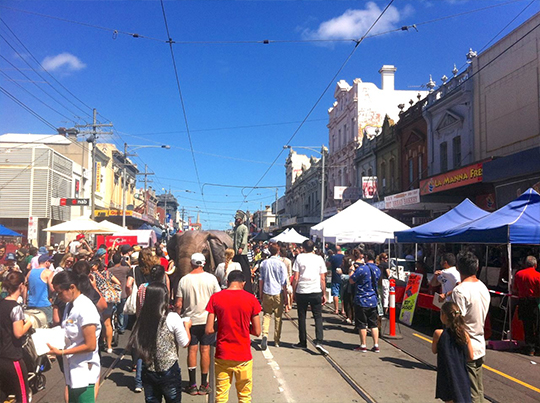Studio I
Studio I: Urban informality in Global North cities
Redento Recio and Tanzil Shafique

Studio Description
Urban informality has often been linked to conditions, relations and transactions occurring in global South countries. Recent literature, however, has revealed a rise in informal economic activities in global North cities due to an insecure economic condition and an increased middle-class desire for more vibrant lifestyles and diverse forms of public space. Several academics have also pointed out the need for planning discipline to respond to issues arising from urban informal employment in European and North American cities. In Australia, various forms of informality and urban commoning have become part of the management of public space.
Building on the knowledge and skills gained/enhanced in their first year, this studio will enable the students to examine different forms and practices of informality in Melbourne and identify the agents and factors that drive such processes. Fieldwork activities will help them determine how informal practices intersect/cofunction with formal rules and processes. Students are expected to analyze how urban planners/designers/managers ‘define’ and ‘manage’ forms of informality. Toward the end of the semester, the students will put forward proposed interventions that enhance the positive impacts and/or address issues arising from identified forms/practices of informality.
Studio Outcomes
- Identify and engage critically with urban informality and planning practice;
- Conduct primary and secondary research guided by a theoretically-informed conceptual framework;
- Identify and propose creative responses to informality and/with informality;
- Identify and respond to ethical issues and understand the notion of justice in planning;
- Understand the relationships between planning, space and politics;
- Demonstrate a capacity to work efficiently and effectively;
- Have the ability to design strategies and timelines for completing individual and collective tasks.
Studio Leaders
Redento B. Recio is a Postdoctoral Research Fellow at the Informal Urbanism (InfUr) Research Hub of the Faculty of Architecture, Building and Planning. Before joining the University of Melbourne in 2018, he had worked with academic institutions, development NGOs, social movements, and private consulting groups in the Philippines. His research interests include urban planning and governance issues in the global South, collective action, and social accountability, among others. His writing has appeared in top journals like Cities; Journal of Urban Affairs; Planning Theory; International Development Planning Review; and Research in Transport Economics, among others.
Tanzil Shafique, Assoc. AIA, is a Ph.D. researcher at the Melbourne School of Design where he also teaches graduate design studios. His Ph.D research investigates morphogenesis of informal settlements. Previously he was a Research Fellow and Studio Instructor at the Fay Jones School of Architecture + Design as well as Project Designer at the Community Design Center, both at the University of Arkansas. His work has garnered numerous AIA National Award for Urban and Regional Planning, as well as his writing on design philosophy and urbanism, has been published internationally. He holds an M.Arch from Rensselaer Polytechnic Institute in New York.
Readings & References
- Devlin, R. T. (2018). Asking ‘Third World questions’ of First World informality: Using Southern theory to parse needs from desires in an analysis of informal urbanism of the global North. Planning Theory, 17(4), 568-587.
- Roy, A. (2005) 'Urban informality: toward an epistemology of planning', Journal of the American Planning Association, 71(2), 147-158.
- Yiftachel, O. (2009) 'Theoretical Notes on "Gray Cities"', Planning Theory, 8(1), 88–100.
- Dovey, K. (2012) ‘Informal urbanism and complex adaptive assemblage’. International Development Planning Review, 34(4), 349-368.
- Iveson, K., Lyons, C., Clark, S., & Weir, S. (2019). The informal Australian city. Australian Geographer, 50(1), 11-27.
- Loukaitou-Sideris, A., & Mukhija, V. (2019). Informal Urbanism and the American City. In The Palgrave Handbook of Bottom-Up Urbanism (pp. 83-96). Palgrave Macmillan, Cham.
- Porter, L. (2011). Informality, the commons and the paradoxes for planning: Concepts and Debates for informality and planning. Planning Theory and Practice, 2(1), 115-120.
Schedule Thursdays 12:00-18:00